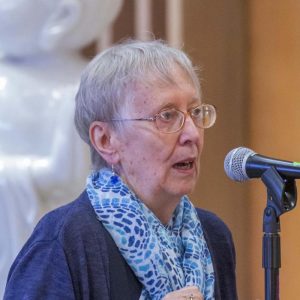
From Dr. Rounds: Convocation 2019
The following is a welcome speech given by DRBU President, Susan Rounds, during Convocation on August 21, 2019.
Welcome to the official beginning of the academic year at DRBU for 2019. Welcome to our new BA and MA students. Welcome to all of our returning students. Welcome to our two new faculty members: Sarah Babcock, and Sean Kerr. We also welcome new staff members Translation Fellows Justin Howe, Yang Liu, and Brenda Lee. Welcome to the Mayor of Ukiah, Mo Mulharen. Welcome to our guests. And welcome to all of our returning faculty and staff. It is truly wonderful to see you all and to know that we will be working together this year as part of this DRBU community.
I have been thinking a lot about that word “community” this summer, in part because of the way that members of this community have opened their hearts and supported me over the last few months since the death of my husband David. In a very personal way, I have experienced what it means to be a part of this community. I’d like to share a few thoughts I have had as I thought about what makes this DRBU community so special.
One important characteristic is that we have all chosen to become members of this community. We have come–as the saying goes– “from the four corners of the earth.”[ That phrase leaped into my mind as I was writing and I did wonder: wait, corners??? It comes from the Bible, the book of Isaiah, from a time when people still believed the earth was flat and did have corners…but I digress] This community is not something we were born into. We each made a conscious determination to be here. There are certainly many possible reasons for making such a decision. But I would venture to guess that there are certain commonalities.
We came to DRBU because it offers us the chance to do important work as we face the challenges of life on this planet in the 21st century. We came because we want to think deeply about important issues. We came because we are not afraid to ask difficult questions. We came because we want to learn from each other. We came because we want to investigate texts drawn from the long history of human inquiry into the meaning of life and the nature of reality.
This work requires a belief in an innate human capacity for wisdom and a willingness to examine deeply held assumptions. And this important work is not done just by our students. One of the things that sustains me as a member of this community is the knowledge that my colleagues are also doing this work, and that they have chosen to be here because the environment supports them in that work.
Another characteristic of this community is that it recognizes the fundamental importance of virtuous conduct. As we engage in intellectually and emotionally challenging work we are guided by a shared commitment to ideals of respect, humility and kindness in our interactions with ourselves and with others. In the words of the Student Code of Conduct–which is not just for students, by the way!–These ideals serve as the foundation for a kind of mental integrity and focus upon which wisdom and compassion are cultivated.
In this community we do not separate the insights gained from academic study and learning from the way we conduct ourselves in our daily lives. We use instances of discomfort, irritation, or unhappiness that inevitably arise in any human group as opportunities for self-reflection and growth. Because we recognize the importance of nurturing respect, humility and kindness, we have adopted Restorative Practice as a way of resolving conflict and restoring harmony in our community. We learn and practice ways of interacting that sustain a safe, inclusive and welcoming environment.
A third characteristic of the DRBU community is that it is not a tribe. This seems to me to be a distinction of supreme importance. Tribes reinforce boundaries between self and other. Members of a tribe are loyal to each other but can react with anger and even horrific violence against those whom they perceive to be different. The identity marker can be skin color, language, religion, sexual or gender identity, or political affiliation, or various combinations of these traits. Tribe members cling to their identities, and these attachments can be manipulated to provoke fear and hatred. Tribes foster scapegoating and bullying rather than nurturing empathy and compassion. They build walls, not bridges.
As I thought about the distinctions between communities and tribes, I was reminded of the poem “Outwitted” by Edwin Markham.
He drew a circle that shut me out–
Heretic, a rebel, a thing to flout.
But Love and I had the wit to win:
We drew a circle that took him in!
From a Buddhist perspective, all of us are inside that circle. Whatever our superficial differences may be, our fundamental nature–the nature of every living creature– is the same: pure, compassionate, and full of light.
Thank you for joining me in this DRBU community and I look forward to a wonderful year working and learning with you all.